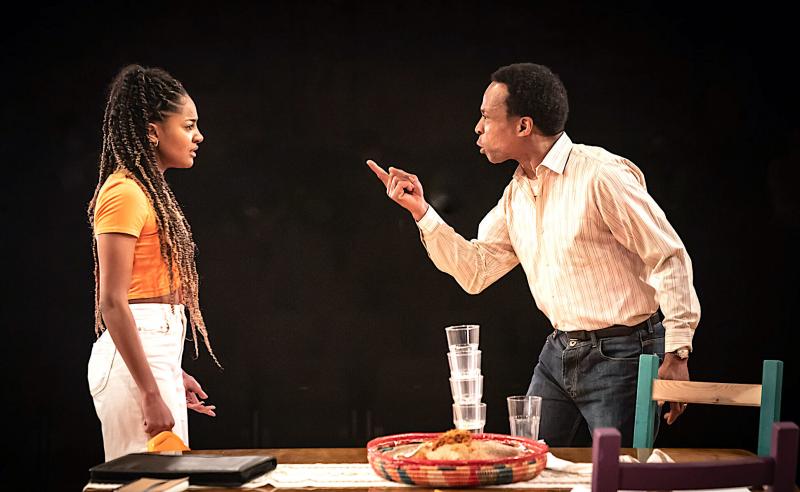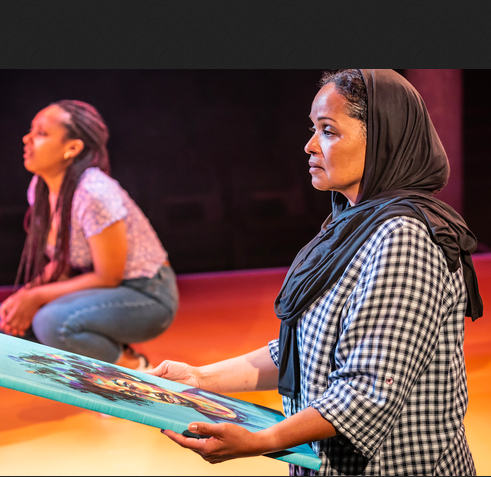House of Ife, Bush Theatre review - an Ethiopian-British family struggle to decide where 'home' is | reviews, news & interviews
House of Ife, Bush Theatre review - an Ethiopian-British family struggle to decide where 'home' is
House of Ife, Bush Theatre review - an Ethiopian-British family struggle to decide where 'home' is
Playwright Beru Tessema makes a striking stage debut

We are in a room in a simply decorated house in northwest London, where an Ethiopian-British family is gathering for a funeral “tea” for 28-year-old Ife, their first-born son and beloved twin brother of aspiring artist Aida. He has died of his crack addiction. But this is not exactly the house of the title.
Ife’s father Solomon (Jude Akuwudike), divorced for eight years from his mother Meron (a dignified Sarah Priddy) and father of a new set of children back in Ethiopia, has notionally built a house for them all there. Meron hoped it would be a refuge from his demons for Ife. Now she plans to rent it out. But Solomon, finally arriving in London at his daughter Tsion’s expense after the funeral, tells them he has turned the house into a refuge for the homeless and now wants their permission to extend it. As a “warrior for Christ”, he trumpets his desire to save souls displaced by civil war and poverty and is appalled by 19-year-old Yosi’s love of videogames and rapping (“Fookerah!” he snorts, a term Yosi doesn't know), though mostly by his son’s lack of that old chestnut, respect.
A complex pattern of tensions is then traced out. Between Meron and Solomon over their treatment of Ife. Between the generations – one African, one Western – raised with different cultural values, especially the younger one of trainee teacher Tsion (Yohanna Ephrem, pictured below with Sarah Priddy) and Yosi (Michael Workeye), who were born in London and are comparatively at home there but feel neglected by their father. And the tensions between those two and their older sister Aida (Karla-Simone Spence), whom they tend to view as a “pagan”, a “yaa” who has left Kentish Town for a leafy town's art school. Yet Tsion admits to having felt at home in Ethiopia on a visit there; and Aida misses both the buzz of London and the simple beauty as she now sees it of the metal-roofed shack she grew up in in Ethiopia. All of them miss the “home” they believe their father could have provided for them, and especially for unhappy Ife. But where to look for it now?
 As the characters increasingly clash and their conversations become more pointed and heated, hidden emotions burst out and secrets are spilt. Tessema orchestrates this dialogue as a thicket of competing styles. It’s often richly comic as well as heartfelt and painful. Particularly fun is the exchange between Yosi, complaining about being “gripsed up” by a “Karen” in a cafe, and Solomon’s uncomprehending response: “You are a child of God. A child of God. You have no business with this Karen!”
As the characters increasingly clash and their conversations become more pointed and heated, hidden emotions burst out and secrets are spilt. Tessema orchestrates this dialogue as a thicket of competing styles. It’s often richly comic as well as heartfelt and painful. Particularly fun is the exchange between Yosi, complaining about being “gripsed up” by a “Karen” in a cafe, and Solomon’s uncomprehending response: “You are a child of God. A child of God. You have no business with this Karen!”
Music is key here, linking the scenes, fuelling the children’s exuberant dancing, underlining the plot’s harmonies and discords. The cast meet this almost musical challenge impressively. Akuwudike pitches his powerful voice perfectly to give his evangelical utterances a revealingly brittle edge. He even sings badly, when showing off to Yosi. We see the pompous self-importance of the man and his way of forging the scriptures into a weapon. Yosi, on the other hand, gives a masterclass in “talking hood”, with Workeye skilfully moving through all the gears of his endz vocabulary. Yosi, we realise, even if his father does not, is not a talentless fool, and being “man of the house” may be his salvation.
Compared to the two men, the sisters feel less developed, more recognisable types than individuated wholes, Tsion the most grounded of the siblings, Aida showing signs of her dead twin's addictive personality; both are sensitively played. What the piece needs overall is a stronger dramatic goal. There’s almost too much going on, with characters talking over each other, competing to be heard, and not always being given enough room for us to focus on them properly. The final plot twist feels a tad too predictable to deliver its assigned thematic load.
But do go and see this piece: what Linton is doing at the Bush is nothing less than, play by play, resetting the dial and giving us an alternative stage language for telling new stories. Check out the venue’s outstanding recent hit, Tyrell Williams’s Red Pitch, as well, now available to stream worldwide until May 14 at bushtheatre.co.uk.
rating
Explore topics
Share this article
The future of Arts Journalism
You can stop theartsdesk.com closing!
We urgently need financing to survive. Our fundraising drive has thus far raised £49,000 but we need to reach £100,000 or we will be forced to close. Please contribute here: https://gofund.me/c3f6033d
And if you can forward this information to anyone who might assist, we’d be grateful.

Subscribe to theartsdesk.com
Thank you for continuing to read our work on theartsdesk.com. For unlimited access to every article in its entirety, including our archive of more than 15,000 pieces, we're asking for £5 per month or £40 per year. We feel it's a very good deal, and hope you do too.
To take a subscription now simply click here.
And if you're looking for that extra gift for a friend or family member, why not treat them to a theartsdesk.com gift subscription?
more Theatre
 Troilus and Cressida, Globe Theatre review - a 'problem play' with added problems
Raucous and carnivalesque, but also ugly and incomprehensible
Troilus and Cressida, Globe Theatre review - a 'problem play' with added problems
Raucous and carnivalesque, but also ugly and incomprehensible
 Clarkston, Trafalgar Theatre review - two lads on a road to nowhere
Netflix star, Joe Locke, is the selling point of a production that needs one
Clarkston, Trafalgar Theatre review - two lads on a road to nowhere
Netflix star, Joe Locke, is the selling point of a production that needs one
 Ghost Stories, Peacock Theatre review - spirited staging but short on scares
Impressive spectacle saves an ageing show in an unsuitable venue
Ghost Stories, Peacock Theatre review - spirited staging but short on scares
Impressive spectacle saves an ageing show in an unsuitable venue
 Hamlet, National Theatre review - turning tragedy to comedy is no joke
Hiran Abeyeskera’s childlike prince falls flat in a mixed production
Hamlet, National Theatre review - turning tragedy to comedy is no joke
Hiran Abeyeskera’s childlike prince falls flat in a mixed production
 Rohtko, Barbican review - postmodern meditation on fake and authentic art is less than the sum of its parts
Łukasz Twarkowski's production dazzles without illuminating
Rohtko, Barbican review - postmodern meditation on fake and authentic art is less than the sum of its parts
Łukasz Twarkowski's production dazzles without illuminating
 Lee, Park Theatre review - Lee Krasner looks back on her life as an artist
Informative and interesting, the play's format limits its potential
Lee, Park Theatre review - Lee Krasner looks back on her life as an artist
Informative and interesting, the play's format limits its potential
 Measure for Measure, RSC, Stratford review - 'problem play' has no problem with relevance
Shakespeare, in this adaptation, is at his most perceptive
Measure for Measure, RSC, Stratford review - 'problem play' has no problem with relevance
Shakespeare, in this adaptation, is at his most perceptive
 The Importance of Being Earnest, Noël Coward Theatre review - dazzling and delightful queer fest
West End transfer of National Theatre hit stars Stephen Fry and Olly Alexander
The Importance of Being Earnest, Noël Coward Theatre review - dazzling and delightful queer fest
West End transfer of National Theatre hit stars Stephen Fry and Olly Alexander
 Get Down Tonight, Charing Cross Theatre review - glitz and hits from the 70s
If you love the songs of KC and the Sunshine Band, Please Do Go!
Get Down Tonight, Charing Cross Theatre review - glitz and hits from the 70s
If you love the songs of KC and the Sunshine Band, Please Do Go!
 Punch, Apollo Theatre review - powerful play about the strength of redemption
James Graham's play transfixes the audience at every stage
Punch, Apollo Theatre review - powerful play about the strength of redemption
James Graham's play transfixes the audience at every stage
 The Billionaire Inside Your Head, Hampstead Theatre review - a map of a man with OCD
Will Lord's promising debut burdens a fine cast with too much dialogue
The Billionaire Inside Your Head, Hampstead Theatre review - a map of a man with OCD
Will Lord's promising debut burdens a fine cast with too much dialogue

Add comment